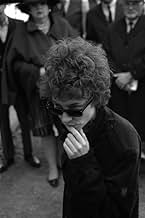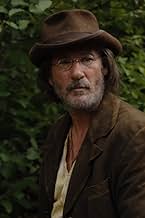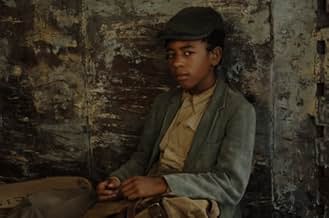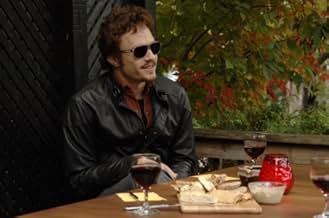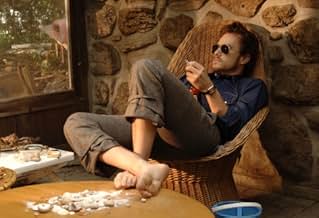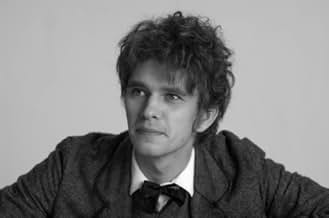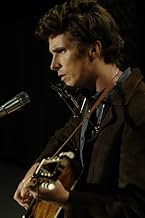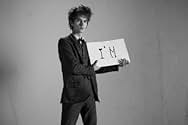VALUTAZIONE IMDb
6,8/10
62.793
LA TUA VALUTAZIONE
Riflessioni sulla vita di Bob Dylan, dove sei personaggi incarnano un aspetto diverso della vita e del lavoro del musicista.Riflessioni sulla vita di Bob Dylan, dove sei personaggi incarnano un aspetto diverso della vita e del lavoro del musicista.Riflessioni sulla vita di Bob Dylan, dove sei personaggi incarnano un aspetto diverso della vita e del lavoro del musicista.
- Candidato a 1 Oscar
- 29 vittorie e 49 candidature totali
Roc Lafortune
- Hobo Moe
- (as Roc LaFortune)
Brian R.C. Wilmes
- Circus Man
- (as Brian RC Wilmes)
Recensioni in evidenza
To appreciate I’m Not There., you need to fully buy into its somewhat-implausible premise; in it, six actors represent various aspects of Bob Dylan throughout his many decades in the limelight. If you buy into this premise, then this is a unique, thoughtful perspective of an almost-unknowable individual, a man who famously played things close to the vest, a man who shunned introspection. But if you don’t immediately buy into this premise, then the movie just feels like a long experiment that isn’t entirely successful, and in the end you don’t feel you know much more about the man, the myth, the legend than you knew going in. Which might be the point, who’s to say? And that’s sort of where I land on the whole I’m Not There. issue.
Here’s one big problem right off the bat. The six various characters, each representing part of Dylan, have different names. Some of them are named after real-life people, like Woody Guthrie and Arthur Rimbaud. Some have fictitious names, like Jude Quinn (an amalgam of Jude from “Hey Jude” and Dylan’s own “The Mighty Quinn”), Jack Rollins, and Robbie Clark - the latter being an actor playing one of the aspects in a movie. And then it gets confusing.
The first gimmick for this movie is that each aspect is played by an actor you wouldn’t expect to see playing Dylan. Okay, maybe not all of them, but some of them. Cate Blanchett is one. She’s female, in case you were unsure, and she is by far the best Dylan in the movie. She plays Jude, the latter-day, peeved-at-everyone Dylan. Another is Marcus Carl Franklin, who plays “Woody Guthrie” - here, a young version of Dylan, riding the rails across the Midwest. Franklin is African American. Then there’s Heath Ledger and Christian Bale, who are Australian (as is Blanchett) and Welsh, respectively. The problem with those, though, is that the only difference between them and the real Dylan is Dylan’s particular linguistic tendencies, so you wind up with just some guys acting Dylanesque. You know, the perpetual cigarette dangling precariously, the hat, the whole nine yards.
It would have been more effective, for me, if each of the aspects was played by completely different looking people - because in order for them to be identifiable as Dylan, they would have to sound like him. Otherwise you’re left with some folk-singing iconoclast who’s rebelling against everyone, and you don’t know why. So there’s one issue. And that would have been a clever, but not too-clever, way for each supposed aspect or time period to be represented. Even if two aspects were on the screen simultaneously, big deal - at least we could tell who was who.
But added to this gimmick is the fact that some non-Dylan characters - and some situations - are based on real-life people, like Allen Ginsburg, and retain their counterparts’ names, and others are clearly supposed to be real people but have … different names. And some situations definitely did occur (such as Dylan’s getting booed at the Newport festival, a huge turning point for him), but did all of them? Were any of them made up to highlight that particular aspect of his personality? One of the characters is Arthur Rimbaud. No, not the poet, he just has that name. Anyway, the entirety of his screen time is spent giving testimony or something to officials (or a jury, I’m not sure). And his speeches are of the deep philosophical sort, the kind that Dylan was apparently fond of - ways to get into people’s minds, but I’m not sure what the soliloquies add in terms of exposition and revelation.
Then there’s also Richard Gere, who plays Billy the Kid, another “aspect” of Dylan. Apparently here Billy is mythologized as this hiding loner at the end of his career, just sort of like Dylan, only Dylan’s not even now at the end of his career, unless he keels over tomorrow, or something. Gere’s good, and I don’t say that often, but I think the aspect, such as it is, is too abstract and unreadable to be worthwhile.
The intermittent narrator (Kris Kristofferson) is marginally helpful; perhaps he could have been used to tie all these aspects together. Instead we get two hours of ego feeding and idol worship. To me, though, it felt more like idle worship than anything else, a waste of time even if you’re willing to grasp whatever deep insights the film pretends to offer to you.
Here’s one big problem right off the bat. The six various characters, each representing part of Dylan, have different names. Some of them are named after real-life people, like Woody Guthrie and Arthur Rimbaud. Some have fictitious names, like Jude Quinn (an amalgam of Jude from “Hey Jude” and Dylan’s own “The Mighty Quinn”), Jack Rollins, and Robbie Clark - the latter being an actor playing one of the aspects in a movie. And then it gets confusing.
The first gimmick for this movie is that each aspect is played by an actor you wouldn’t expect to see playing Dylan. Okay, maybe not all of them, but some of them. Cate Blanchett is one. She’s female, in case you were unsure, and she is by far the best Dylan in the movie. She plays Jude, the latter-day, peeved-at-everyone Dylan. Another is Marcus Carl Franklin, who plays “Woody Guthrie” - here, a young version of Dylan, riding the rails across the Midwest. Franklin is African American. Then there’s Heath Ledger and Christian Bale, who are Australian (as is Blanchett) and Welsh, respectively. The problem with those, though, is that the only difference between them and the real Dylan is Dylan’s particular linguistic tendencies, so you wind up with just some guys acting Dylanesque. You know, the perpetual cigarette dangling precariously, the hat, the whole nine yards.
It would have been more effective, for me, if each of the aspects was played by completely different looking people - because in order for them to be identifiable as Dylan, they would have to sound like him. Otherwise you’re left with some folk-singing iconoclast who’s rebelling against everyone, and you don’t know why. So there’s one issue. And that would have been a clever, but not too-clever, way for each supposed aspect or time period to be represented. Even if two aspects were on the screen simultaneously, big deal - at least we could tell who was who.
But added to this gimmick is the fact that some non-Dylan characters - and some situations - are based on real-life people, like Allen Ginsburg, and retain their counterparts’ names, and others are clearly supposed to be real people but have … different names. And some situations definitely did occur (such as Dylan’s getting booed at the Newport festival, a huge turning point for him), but did all of them? Were any of them made up to highlight that particular aspect of his personality? One of the characters is Arthur Rimbaud. No, not the poet, he just has that name. Anyway, the entirety of his screen time is spent giving testimony or something to officials (or a jury, I’m not sure). And his speeches are of the deep philosophical sort, the kind that Dylan was apparently fond of - ways to get into people’s minds, but I’m not sure what the soliloquies add in terms of exposition and revelation.
Then there’s also Richard Gere, who plays Billy the Kid, another “aspect” of Dylan. Apparently here Billy is mythologized as this hiding loner at the end of his career, just sort of like Dylan, only Dylan’s not even now at the end of his career, unless he keels over tomorrow, or something. Gere’s good, and I don’t say that often, but I think the aspect, such as it is, is too abstract and unreadable to be worthwhile.
The intermittent narrator (Kris Kristofferson) is marginally helpful; perhaps he could have been used to tie all these aspects together. Instead we get two hours of ego feeding and idol worship. To me, though, it felt more like idle worship than anything else, a waste of time even if you’re willing to grasp whatever deep insights the film pretends to offer to you.
I recently watched I'm not there and this movie isn't done in a way that really makes sense sometimes or flows, but after the first 10 minutes you really understand what is happening.This movie has differen't stories from differen't characters that come in and differen't times, and they all have something to do with bob Dylan's life.I thought the movie was gonna show one story at a time, but they show one for like 5 minutes then another one and comeback to it later and sometimes only show a clip for it for a few seconds.This is done in a very art-house style and is for fans of the genre, it isn't abstract crap like some movies but actually has some great scenes that are visually wonderful.Some scenes play like Fellini's 81/2 and this movie feels like a foreign film a lot of the time but the characters speak English.This movie is far from perfect for my taste and I am not a huge Dylan fan but I respect him a lot, the movie pretty much does a good job at pulling you into it and you go for a ride.It's well made and the acting is good all around, don't watch the movie if you don't like art type films or movies that focus on characters and out of place scenes that are put there for a visual purpose.It's a cool flick and I think a lot of people can respect it, it's nice to see something original and not in some movie formula like a lot of Hollywood blockbusters we get these days.
I saw this yesterday at my local art-house cinema, with my grandparents who were young when Bob Dylan was 'big' (is my lack of knowledge about Dylan already showing? Oh dear), and I have to say, I'm glad I was there - even if Bob Dylan wasn't.
The much-publicised, overly re-hashed concept driving the film is this: Dylan is portrayed by six actors of different races, ages and genders, none of whom are named Dylan, but represent aspects of his personality and life story. Every art-house buff will squeal at this delightfully off-kilter concept (well, except that it's been done before) - but never used so cleverly I'll admit. But, the cleverness of the concept only remains clever if it is executed well. This is where most people have a problem with the film.
Most of what you may have read in reviews is correct. The film is challenging, borderline plot-less (unless you are generally acquainted with Dylan's life) and seems muddled (again, only if you don't have a general knowledge of his life). For anyone who can't grasp the basic, "each actor represents a stage etc." concept, this film will be lost on them completely... because it gets even more complicated! The film is so layered, with hidden in-jokes, and snippets of real quotes from songs and interviews with Dylan used as dialogue, and story lines within story lines. A great example is Heath Ledger's character: Ledger (an actor), plays an actor, playing Jack Rollins in a biopic, who is the representation of folk-singer-Dylan (a stage). An actor in a biopic playing an actor in a biopic about a singer representing Bob Dylan played by an actor in a biopic. The self-parody is just hilarious in this film.
To add to these 'layers', each actor's "stage" that they represent is filmed in a distinctive cinematic style, for example, the Cate Blanchett as Jude Quinn representing Bob Dylan sequence is shot in lush black and white. Haynes relishes this opportunity to show off, and he does. The film is stylistically stimulating, even if it does drag sometimes for ignoramuses like me who know literally nothing about Bob Dylan.
For those questioning the film's intentions as a biopic, I should think it was really obvious! The opening credits give a huge clue, as the main title comes up in stages: "I", "He", "I'm he", "I'm her", "Not her", "Not here", "I'm not there".
The film is like a dream: you come out of it with this vague (exact details in the film are scarce) and vivid impression of Dylan's personality, without learning anything. The title is certainly relevant - Haynes' actually conceals Dylan in this film! This biopic is conventional in the way it still presents a chronological life story if you arrange it all together and remember the actors represent one person, but it is different in the way it doesn't try to make a real person into a character for a film. This is really the only way to represent someone - by not.
This film is composed of stories and individual representations and metaphors that describe a person's life, their attitudes at points in time and aspects of their personality, but gives us nothing. Absolutely nothing.
So, if you're ready to put the level of effort and concentration required to appreciate and maybe like the film, go for it. But I was not prepared for this film and I wish I'd read a biography before I saw it. That said, not knowing anything did help in a way, as after we had several questions about events in the film and their basis in reality. After all, the trailer had told us that stories were exaggerated, fictionalised, imagined and true. It inspired me enough to look him up on Wikipedia (I know, such dedication!).
The performances are all generally good. Blanchett, Bale and Franklin impressed me the most. Blanchett only falls short because of her voice, but she has the accent correct, and she can't change her voice that much! She became more believable as the film progressed. Charlotte Gainsbourg is also quietly moving in her role as the neglected wife of Ledger's character.
My final opinion is that the film is well executed, but only once you've had time to ruminate on it, research Dylan and hear the director's thoughts on his own work. I read a great deal of reviews as well that helped me to understand (not that I didn't like the film initially; I liked it after I saw it anyway). Appreciation builds the more I learn about the film and the intricate connections between it and it's un-subject.
That said, should a film be this much hard work just to like? Not for some people, but for others, the effort is worth it. It does eventually pay off, but it's exhausting.
The much-publicised, overly re-hashed concept driving the film is this: Dylan is portrayed by six actors of different races, ages and genders, none of whom are named Dylan, but represent aspects of his personality and life story. Every art-house buff will squeal at this delightfully off-kilter concept (well, except that it's been done before) - but never used so cleverly I'll admit. But, the cleverness of the concept only remains clever if it is executed well. This is where most people have a problem with the film.
Most of what you may have read in reviews is correct. The film is challenging, borderline plot-less (unless you are generally acquainted with Dylan's life) and seems muddled (again, only if you don't have a general knowledge of his life). For anyone who can't grasp the basic, "each actor represents a stage etc." concept, this film will be lost on them completely... because it gets even more complicated! The film is so layered, with hidden in-jokes, and snippets of real quotes from songs and interviews with Dylan used as dialogue, and story lines within story lines. A great example is Heath Ledger's character: Ledger (an actor), plays an actor, playing Jack Rollins in a biopic, who is the representation of folk-singer-Dylan (a stage). An actor in a biopic playing an actor in a biopic about a singer representing Bob Dylan played by an actor in a biopic. The self-parody is just hilarious in this film.
To add to these 'layers', each actor's "stage" that they represent is filmed in a distinctive cinematic style, for example, the Cate Blanchett as Jude Quinn representing Bob Dylan sequence is shot in lush black and white. Haynes relishes this opportunity to show off, and he does. The film is stylistically stimulating, even if it does drag sometimes for ignoramuses like me who know literally nothing about Bob Dylan.
For those questioning the film's intentions as a biopic, I should think it was really obvious! The opening credits give a huge clue, as the main title comes up in stages: "I", "He", "I'm he", "I'm her", "Not her", "Not here", "I'm not there".
The film is like a dream: you come out of it with this vague (exact details in the film are scarce) and vivid impression of Dylan's personality, without learning anything. The title is certainly relevant - Haynes' actually conceals Dylan in this film! This biopic is conventional in the way it still presents a chronological life story if you arrange it all together and remember the actors represent one person, but it is different in the way it doesn't try to make a real person into a character for a film. This is really the only way to represent someone - by not.
This film is composed of stories and individual representations and metaphors that describe a person's life, their attitudes at points in time and aspects of their personality, but gives us nothing. Absolutely nothing.
So, if you're ready to put the level of effort and concentration required to appreciate and maybe like the film, go for it. But I was not prepared for this film and I wish I'd read a biography before I saw it. That said, not knowing anything did help in a way, as after we had several questions about events in the film and their basis in reality. After all, the trailer had told us that stories were exaggerated, fictionalised, imagined and true. It inspired me enough to look him up on Wikipedia (I know, such dedication!).
The performances are all generally good. Blanchett, Bale and Franklin impressed me the most. Blanchett only falls short because of her voice, but she has the accent correct, and she can't change her voice that much! She became more believable as the film progressed. Charlotte Gainsbourg is also quietly moving in her role as the neglected wife of Ledger's character.
My final opinion is that the film is well executed, but only once you've had time to ruminate on it, research Dylan and hear the director's thoughts on his own work. I read a great deal of reviews as well that helped me to understand (not that I didn't like the film initially; I liked it after I saw it anyway). Appreciation builds the more I learn about the film and the intricate connections between it and it's un-subject.
That said, should a film be this much hard work just to like? Not for some people, but for others, the effort is worth it. It does eventually pay off, but it's exhausting.
This was the semantically richest and emotionally deepest film experience I have had in years. And since I am different now that I was five years ago, it could qualify as near my favorite. It will likely not be so for you, at least to approach the way I did. It seems that you have to be my age, and have lived through the events the wrap this. Also, you have to have invested some part of your personal poetry in that of this man. And finally, you have to be sufficiently cineliterate to follow the amazing shape of the eye-concepts that are serially birthed.
Often I say that essentially all films are about other films, rarely reaching life. This does that, reaching life, but by going through, punching through art by force. It presents a collage of images in such a way that we can see through the space in them to truth. Its an amazing feat. But in order for it to work, you have to have those patches sparkle for you.
So for instance you have to have internalized Fellini's one masterpiece, and be yearning for decades to escape the now close confines of the imagination set then. Of course when it was new, it was a wild ramble in the jungle, but now turn to tethers in the park. You really have to chafe at what passes for cinematic art, and dream of the next film, the one that will do for us what "8 1/2" did then.
You also have to have lived through the blasphemy of the Vitenam war and ideally have been on the "right side" throughout and still bear the pain of it. You have to seriously, even though the director is too young for this have had your life ruined by the revelation of a lying government, coupled with the spinning parade of false hopes from artists, many of whom we still admire. You have to have built your life taking into account mistrust.
But you also have to have had this particular dancer as a focus. This man who split into so many men, most of whom were designed to charm, all of whom weren't men at all but crystallized paths to salvation. You have to have invested in a few of these paths yourself enough so that it cost you more than it ever could Dylan.
If you have all of these traits then you already have the web on which this tarantula dances. And this will seep into you like some exotic solvent carrying subtle hallucinogens. And it will haunt you forever. Oh, you'll be able to slough it off and pretend that this is merely a clever puzzle of kinematic trivia. But this will hurt. It will hurt a lot, but only because of memories now defused.
It will make you soar as well, because it is so massively glorious. Many Dylans, well of course. Different ages, races, sexes. My, surely true.
Stories about films of one in another, about hiding from each other, about having sex with and spatting with each other. About disowning, and writing about each other. About one being another's blood, who is the hidden eyebrow of another in a Joycean web, but one that makes sense because it is made out of the stuff that made us.
What impresses me so much is that even before this was conceived the filmmaker had to know something like this fabric of selves existed. And he had to without having lived it himself develop deep intuitions about how this specific soul danced upon us in music and images. He had to understand how to borrow and bend those images with the music in ways that would make Julie Taymor blush: "Thin Man" used not for confused sexual tension but the conflating of superficial dylanology with artistic expiration. "Pat Garrett" as the context for a world rather than the escape from one. Over and over again the juxtapositions of life events, image and music (often performed by others in strange deviations) are all wrong but so right.
And then this artist had to see it all cinematically, to send it directly into our soul. I suppose this is a particularly broad leap because of the disconnected way this must have been made.
I celebrate this. You might wonder if it worked for someone, somewhere. It sure did for me.
Cate understands the whole enterprise, from the outside, all the way through every layer. What a soul!
Ted's Evaluation -- 4 of 3: Every cineliterate person should experience this.
Often I say that essentially all films are about other films, rarely reaching life. This does that, reaching life, but by going through, punching through art by force. It presents a collage of images in such a way that we can see through the space in them to truth. Its an amazing feat. But in order for it to work, you have to have those patches sparkle for you.
So for instance you have to have internalized Fellini's one masterpiece, and be yearning for decades to escape the now close confines of the imagination set then. Of course when it was new, it was a wild ramble in the jungle, but now turn to tethers in the park. You really have to chafe at what passes for cinematic art, and dream of the next film, the one that will do for us what "8 1/2" did then.
You also have to have lived through the blasphemy of the Vitenam war and ideally have been on the "right side" throughout and still bear the pain of it. You have to seriously, even though the director is too young for this have had your life ruined by the revelation of a lying government, coupled with the spinning parade of false hopes from artists, many of whom we still admire. You have to have built your life taking into account mistrust.
But you also have to have had this particular dancer as a focus. This man who split into so many men, most of whom were designed to charm, all of whom weren't men at all but crystallized paths to salvation. You have to have invested in a few of these paths yourself enough so that it cost you more than it ever could Dylan.
If you have all of these traits then you already have the web on which this tarantula dances. And this will seep into you like some exotic solvent carrying subtle hallucinogens. And it will haunt you forever. Oh, you'll be able to slough it off and pretend that this is merely a clever puzzle of kinematic trivia. But this will hurt. It will hurt a lot, but only because of memories now defused.
It will make you soar as well, because it is so massively glorious. Many Dylans, well of course. Different ages, races, sexes. My, surely true.
Stories about films of one in another, about hiding from each other, about having sex with and spatting with each other. About disowning, and writing about each other. About one being another's blood, who is the hidden eyebrow of another in a Joycean web, but one that makes sense because it is made out of the stuff that made us.
What impresses me so much is that even before this was conceived the filmmaker had to know something like this fabric of selves existed. And he had to without having lived it himself develop deep intuitions about how this specific soul danced upon us in music and images. He had to understand how to borrow and bend those images with the music in ways that would make Julie Taymor blush: "Thin Man" used not for confused sexual tension but the conflating of superficial dylanology with artistic expiration. "Pat Garrett" as the context for a world rather than the escape from one. Over and over again the juxtapositions of life events, image and music (often performed by others in strange deviations) are all wrong but so right.
And then this artist had to see it all cinematically, to send it directly into our soul. I suppose this is a particularly broad leap because of the disconnected way this must have been made.
I celebrate this. You might wonder if it worked for someone, somewhere. It sure did for me.
Cate understands the whole enterprise, from the outside, all the way through every layer. What a soul!
Ted's Evaluation -- 4 of 3: Every cineliterate person should experience this.
If you are thinking about seeing this movie I would suggest that you research Dylan first; otherwise you will be lost from the get-go, like I was.
You need to know that the characters all represent different aspects of Dylan, and that even though they are "Dylan" they have different names. Some of the Dylan aspects are personified as a young black boy using the name Woody Guthrie, a woman, and a middle-aged Billy the Kidd, for example. And the film jumps from character to character and then back again, frequently.
Chances are, if you are not an art film aficionado, you won't care for this one. On the other hand, if you do your Dylan homework, you may very well enjoy it even though it isn't typical mainstream movie fare.
You need to know that the characters all represent different aspects of Dylan, and that even though they are "Dylan" they have different names. Some of the Dylan aspects are personified as a young black boy using the name Woody Guthrie, a woman, and a middle-aged Billy the Kidd, for example. And the film jumps from character to character and then back again, frequently.
Chances are, if you are not an art film aficionado, you won't care for this one. On the other hand, if you do your Dylan homework, you may very well enjoy it even though it isn't typical mainstream movie fare.
Lo sapevi?
- QuizTodd Haynes needed to get approval from Bob Dylan to use his music, since (unlike in his Velvet Goldmine (1998) where David Bowie did not give his permission for his music) he felt the film would not work without it. At the encouragement of Dylan's manager, Haynes wrote a one-page summary of his concept and the characters, which Dylan approved. It took another 6 years to get the film made due to funding difficulties.
- BlooperWhen Woody's character is first seen he is running towards a train going North but when he is sitting on the train, it is noticeably going South.
- Citazioni
Billy the Kid: People are always talking about freedom. Freedom to live a certain way, without being kicked around. Course the more you live a certain way, the less it feel like freedom. Me, uhm, I can change during the course of a day. I wake and I'm one person, when I go to sleep I know for certain I'm somebody else. I don't know who I am most of the time.
- Curiosità sui creditiThe way the title appears on the screen at the opening would read: I he I'm her not her not here. I'm not there" (period included).
- Colonne sonoreGoin' to Acapulco
Performed by Jim James and Calexico
Written by Bob Dylan
Published by Dwarf Music (SESAC)
Produced by Joey Burns
Jim James appears courtesy of ATO Records
Calexico appears courtesy of Quarterstick Records
I più visti
Accedi per valutare e creare un elenco di titoli salvati per ottenere consigli personalizzati
Dettagli
- Data di uscita
- Paesi di origine
- Siti ufficiali
- Lingua
- Celebre anche come
- Mi historia sin mi
- Luoghi delle riprese
- Aziende produttrici
- Vedi altri crediti dell’azienda su IMDbPro
Botteghino
- Budget
- 20.000.000 USD (previsto)
- Lordo Stati Uniti e Canada
- 4.017.609 USD
- Fine settimana di apertura Stati Uniti e Canada
- 730.819 USD
- 25 nov 2007
- Lordo in tutto il mondo
- 11.792.542 USD
- Tempo di esecuzione2 ore 15 minuti
- Colore
- Mix di suoni
- Proporzioni
- 2.35 : 1
Contribuisci a questa pagina
Suggerisci una modifica o aggiungi i contenuti mancanti





